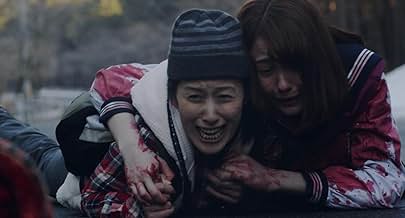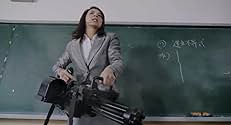AVALIAÇÃO DA IMDb
6,1/10
8,7 mil
SUA AVALIAÇÃO
Estudantes do colegial, incluindo Mitsuko, Keiko e Izumi, tornam-se alvos de entidades sobrenaturais homicidas, dentre eles um porco e uma professora com uma metralhadora. Será tudo um pesad... Ler tudoEstudantes do colegial, incluindo Mitsuko, Keiko e Izumi, tornam-se alvos de entidades sobrenaturais homicidas, dentre eles um porco e uma professora com uma metralhadora. Será tudo um pesadelo? Ou um jogo?Estudantes do colegial, incluindo Mitsuko, Keiko e Izumi, tornam-se alvos de entidades sobrenaturais homicidas, dentre eles um porco e uma professora com uma metralhadora. Será tudo um pesadelo? Ou um jogo?
- Prêmios
- 2 vitórias no total
- Direção
- Roteiristas
- Elenco e equipe completos
- Produção, bilheteria e muito mais no IMDbPro
Avaliações em destaque
With an opening sequence that tops 'Suicide Club" in shock value, aesthetics and eeriness, "Tag" targets a gore-hungry audience, but goes deeper with the many philosophical and psychological themes of determinism, power, fear, reality and identity.
"Tag" tackles greater issues than most films and does so well with a brisk pace that takes the viewer along the joyride (or hellride depending on how you see it) and makes him/her identify with the lead character's distress. The three leads who play the same persona are very well cast and effective in edging us into our seats. Their acting is grounded while the rest of the movie is often over the top at parts.
The daring premise, edgy editing, themes and tones are strong, yet Sono falls slightly short of his best work by making a clearly uneven piece at times with some easy thrills and instances with little coherence or content sneaking in. He proves showy, self-indulgent, eager to please the crowd and even uses questionable short-cuts instead of going deeper into the surreal, suspenseful and sublime narrative.
We are left with many questions like many of Sono's films, but in this case, we also understand that perhaps he could have asked himself more questions in the making in order to overcome some unwanted extraneous confusion and loss of focus. This is especially troublesome as it clocks less than 90 mins (uncharacteristic for long-winded Sono - see 237 mins "Love Exposure" as extreme example) and still shows some filler farce instead of sure hit fire-power.
Some superficial moments over subtlety and substance holds this film back, but the brute force and fantastic screen-writing and directing defy denying this fresh film its place into the pantheon of path-breaking provocative piece of cinema.
Despite its minor and more blatant flaws, this film holds well to a metaphorical mirror and is not in search of identity like its main character. It is disconnected beyond its useful purpose, but parades around arguably able to arouse sympathy and separately speak volume on our psychological individual and societal brink of breakdown.
Try to be spontaneous. Accept the surreal and tolerate the slapstick and silliness.
Japan 2015 | 85 mins | FANTASIA INTERNATIONAL FILM FESTIVAL | DCP | Japanese (English subtitles)
"Tag" tackles greater issues than most films and does so well with a brisk pace that takes the viewer along the joyride (or hellride depending on how you see it) and makes him/her identify with the lead character's distress. The three leads who play the same persona are very well cast and effective in edging us into our seats. Their acting is grounded while the rest of the movie is often over the top at parts.
The daring premise, edgy editing, themes and tones are strong, yet Sono falls slightly short of his best work by making a clearly uneven piece at times with some easy thrills and instances with little coherence or content sneaking in. He proves showy, self-indulgent, eager to please the crowd and even uses questionable short-cuts instead of going deeper into the surreal, suspenseful and sublime narrative.
We are left with many questions like many of Sono's films, but in this case, we also understand that perhaps he could have asked himself more questions in the making in order to overcome some unwanted extraneous confusion and loss of focus. This is especially troublesome as it clocks less than 90 mins (uncharacteristic for long-winded Sono - see 237 mins "Love Exposure" as extreme example) and still shows some filler farce instead of sure hit fire-power.
Some superficial moments over subtlety and substance holds this film back, but the brute force and fantastic screen-writing and directing defy denying this fresh film its place into the pantheon of path-breaking provocative piece of cinema.
Despite its minor and more blatant flaws, this film holds well to a metaphorical mirror and is not in search of identity like its main character. It is disconnected beyond its useful purpose, but parades around arguably able to arouse sympathy and separately speak volume on our psychological individual and societal brink of breakdown.
Try to be spontaneous. Accept the surreal and tolerate the slapstick and silliness.
Japan 2015 | 85 mins | FANTASIA INTERNATIONAL FILM FESTIVAL | DCP | Japanese (English subtitles)
If you like to look at hot girls running, this is a movie for you, as that makes up about 80 % of the movie, there's also a lot of pillow fighting, but also a lot of gore and violence. There is a plot in between of all that, but it doesn't make that much sense and I don't think it is supposed to. There is also a "twist" and some kind of a gender issue message at the end, but honestly I am not sure. I'd say if you're going to watch this movie - just turn off your mind and enjoy the scenery.
If nothing else, Sion Sono possesses an admirable work ethic. Depending on how one counts such things (and despite the often sprawling length of his films), he's averaged at least one major theatrical release per year since catching the attention of international cinephiles and horror nerds with 2001's Suicide Club. That's on top of an ambitious schedule of television shows, short films and little-seen mystery projects. Even so, 2015 was a banner year. Over a twelve-month period, the director cranked out five full-length features in a bewildering variety of genres and styles, finally rivaling the mad profligacy of Takashi Miike, Sono's countryman and peer in overcranked eccentricity.
Tag, the first of these films semi-available to Western viewers, is an ambitious if modestly budgeted exercise in surrealist dream-horror. Sono's film takes inspiration and its Japanese title, "Riaru Onigokko" ("Real Tag"), from a popular science fiction thriller by teen-lit superstar Yusuke Yamada. Given that the novel in question recently spawned not only a successful screen adaptation but an entire, ongoing film franchise, it might seem strange that a celebrated art-house iconoclast would so soon choose to pay it another visit. In scripting his own version, however, Sono deviates significantly from Yamada's text, twisting the straightforward tale of a young man hunted by mysterious forces into a fragmentary, gore-soaked and frequently comical deconstruction of female identity in contemporary media and society.
The story concerns a teenager named Mitsuko (Reina Triendl) and her attempts to navigate the inconstant landscape of what I hesitate to call her reality. We're given little opportunity to know Mitsuko, as Tag provides us no access to her past or inner life. Instead she's a blank and rather sleepy slate, and we drop into her ordinary schoolgirl's day in stereotypical media res. When the relative calm of a brief opening idyll explodes in grisly mayhem, we understand no more than Mitsuko herself, and from there we tumble with her, bouncing repeatedly from confusion to carnage and back again. Nothing we encounter coheres for more than a moment or two, not even Mitsuko's paper-thin sense of self.
As our hapless heroine's trip down the razor-lined rabbit hole progresses, even her name and face become subject to revision. Though Triendl's Mitsuko remains central, three actresses eventually step in and out of the lead role. Mariko Shinoda plays the character as bride- to-be "Keiko", while Erina Mano appears as a determined young athlete named "Izumi", each quite strong and distinct in her portrayal. It's worth noting here that much of Tag's runtime is populated exclusively by women. This lends a distinctly political edge to the film's constant threat of apocalyptic violence, especially when combined with the polymorphous protagonist's adaptive blankness. For those who might need a bit more prompting, a hilariously bizarre third-act reversal makes Sono's intentions crystal clear.
I don't know about you, but I'm a sucker for bugged-out existential thrillers in which the fundamental nature of reality is called into question, so I found Tag's shifting, looping, self-sabotaging storyline quite intriguing. Better yet, Sono corrals his penchant for long-winded digression this time out, confining himself to a careening, 85-minute sprint. This allows the film's disruptions and mysteries to retain their charge from beginning to end, despite the fact that "making sense" isn't high on the agenda. Many will doubtless feel cheated by the elliptical resolution, but as far as I'm concerned, the thrill of the ride more than justifies the price of admission.
Tag, the first of these films semi-available to Western viewers, is an ambitious if modestly budgeted exercise in surrealist dream-horror. Sono's film takes inspiration and its Japanese title, "Riaru Onigokko" ("Real Tag"), from a popular science fiction thriller by teen-lit superstar Yusuke Yamada. Given that the novel in question recently spawned not only a successful screen adaptation but an entire, ongoing film franchise, it might seem strange that a celebrated art-house iconoclast would so soon choose to pay it another visit. In scripting his own version, however, Sono deviates significantly from Yamada's text, twisting the straightforward tale of a young man hunted by mysterious forces into a fragmentary, gore-soaked and frequently comical deconstruction of female identity in contemporary media and society.
The story concerns a teenager named Mitsuko (Reina Triendl) and her attempts to navigate the inconstant landscape of what I hesitate to call her reality. We're given little opportunity to know Mitsuko, as Tag provides us no access to her past or inner life. Instead she's a blank and rather sleepy slate, and we drop into her ordinary schoolgirl's day in stereotypical media res. When the relative calm of a brief opening idyll explodes in grisly mayhem, we understand no more than Mitsuko herself, and from there we tumble with her, bouncing repeatedly from confusion to carnage and back again. Nothing we encounter coheres for more than a moment or two, not even Mitsuko's paper-thin sense of self.
As our hapless heroine's trip down the razor-lined rabbit hole progresses, even her name and face become subject to revision. Though Triendl's Mitsuko remains central, three actresses eventually step in and out of the lead role. Mariko Shinoda plays the character as bride- to-be "Keiko", while Erina Mano appears as a determined young athlete named "Izumi", each quite strong and distinct in her portrayal. It's worth noting here that much of Tag's runtime is populated exclusively by women. This lends a distinctly political edge to the film's constant threat of apocalyptic violence, especially when combined with the polymorphous protagonist's adaptive blankness. For those who might need a bit more prompting, a hilariously bizarre third-act reversal makes Sono's intentions crystal clear.
I don't know about you, but I'm a sucker for bugged-out existential thrillers in which the fundamental nature of reality is called into question, so I found Tag's shifting, looping, self-sabotaging storyline quite intriguing. Better yet, Sono corrals his penchant for long-winded digression this time out, confining himself to a careening, 85-minute sprint. This allows the film's disruptions and mysteries to retain their charge from beginning to end, despite the fact that "making sense" isn't high on the agenda. Many will doubtless feel cheated by the elliptical resolution, but as far as I'm concerned, the thrill of the ride more than justifies the price of admission.
This movie has a very promising premise, but fell short of my expectation.
As a horror, it is not at all scary, leaving no fear in the aftertaste. As a psychological thriller, it lacks suspense and a logical plot development as well as world building. As a moral lesson, it could have done much better with more subtlety.
The only thing I like about it is the aforementioned opening scene and the wedding scene where tension is built up quite well.
A very ambitious hot pot, but not at all tasty.
I loved parts of it and absolutely despised other parts of it.
The film accomplishes leaving the audience member with a sense of escape from eternal solitude and despair. This is an amazing thing to make others feel. Sadly, there is alot of random annoying things in the film too.
Watch it if you are interested.
The film accomplishes leaving the audience member with a sense of escape from eternal solitude and despair. This is an amazing thing to make others feel. Sadly, there is alot of random annoying things in the film too.
Watch it if you are interested.
Você sabia?
- CuriosidadesThe music used in the background is the same music in The Walking Dead opening score.
- Erros de gravaçãoIn the beginning, when the buses and girls are sliced in half, many of the bodies spurt blood into the air, like geysers. But this wouldn't happen, because without the top halves of their bodies, they would be missing the organ responsible for the movement of all blood in a body--their hearts.
- ConexõesRemake of Riaru onigokko (2008)
Principais escolhas
Faça login para avaliar e ver a lista de recomendações personalizadas
- How long is Tag?Fornecido pela Alexa
Detalhes
Bilheteria
- Faturamento bruto mundial
- US$ 995.024
- Tempo de duração1 hora 25 minutos
- Cor
- Proporção
- 1.85 : 1
Contribua para esta página
Sugerir uma alteração ou adicionar conteúdo ausente

Principal brecha
What is the Japanese language plot outline for O Mundo da Perseguição (2015)?
Responda





















